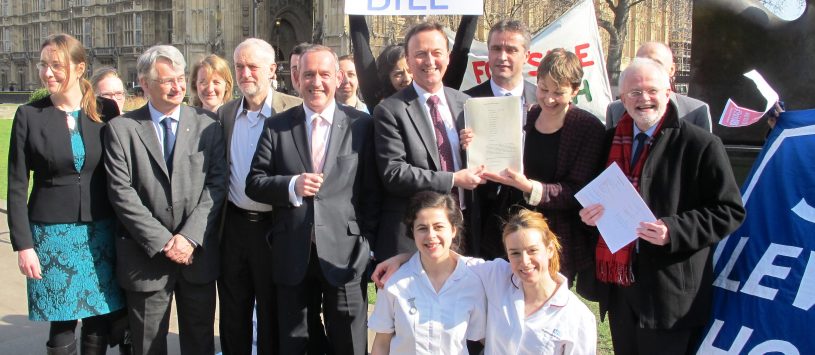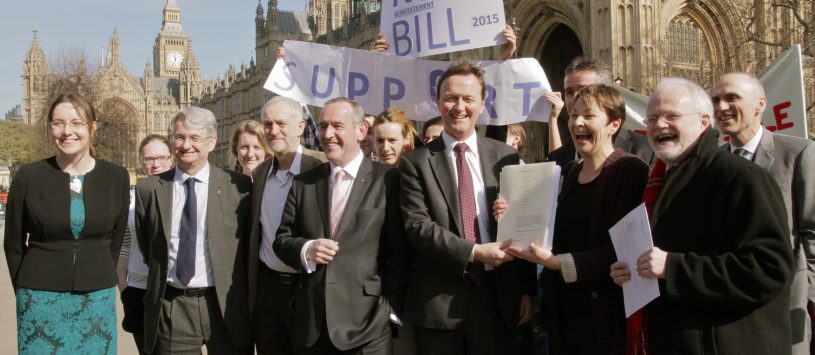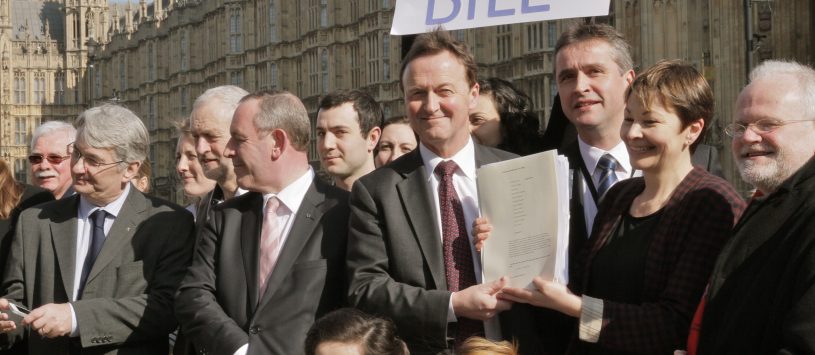Allyson Pollock and Peter Roderick have written a response to a post on the Socialist Health Association website by Irwin Brown on the NHS Reinstatement Bill.
The full response is available as a pdf here, and also posted below.
Irwin Brown writes: “The NHS Reinstatement Bill is expected to have its second reading in March 2016. It would replace the current NHS architecture with a return to Regional and District Health Authorities.”
Our response: The Bill does not do this. The Bill replaces clinical commissioning groups (CCGs), transforms NHS England into a Special Health Authority, and abolishes the market structures (NHS Trusts, NHS Foundation Trusts and Monitor). The Bill does not return to regional and district authorities (the first consultation draft put out in August 2014 proposed district authorities and regional committees of NHS England). The Bill replaces CCGs with Health Boards (the bodies in Scotland and Wales) approved by the Secretary of State on the basis of bottom-up proposals. The Bill also proposes regional committees of NHS England (as in the first consultation draft).
IB writes: “[The Bill] seeks to address some genuine problems but it is the wrong solution. Nobody believes the Bill can become law but it raises some key issues about the NHS. What is important is that looking at such a narrow and technical issue should not be allowed to drown out more important discussions around social care and funding. There are no solutions any more looking at the NHS in isolation.”
Our response: The Bill is neither narrow nor technical. It is returning the NHS to its founding principles after 25 years of marketisation favoured by Tory and New Labour governments. And it’s not looking at the NHS in isolation; it contains the only specific statutory proposal we are aware of for initiating a systematic integration of health and social care in England, along the lines implemented in Scotland.
IB writes: “Trying to raise public interest in campaigns which deal with NHS structures is unlikely to have any impact. The claim is that the Bill would prevent privatisation and reinstate the NHS; although few believe we have already lost our NHS – the public certainly don’t.”
Our response: Thanks for telling us we’re wasting our time! This isn’t our experience. When people are informed of what market policies have done to the NHS, many are incensed. New Labour denial and Tory stealth reinforce disillusion with politics.
IB writes: “Of course passing legislation cannot prevent anything, any determined administration would just pass its own legislation. The only way to prevent privatisation is to elect a government that is against it.”
Our response: Passing legislation is necessary in order to prevent privatisation. IB seems to be saying something else – about how such legislation could happen. But it’s not an argument against new legislation to say that later legislation can amend it. (It might be an argument for never legislating, but that’s another topic!)
IB writes: “In Scotland and Wales there is no market but also no need for actual legal prohibition on the use of private providers. In the 1980’s when a structure such as that proposed by the Bill was in place the Tory government imposed Compulsory Competitive Tendering on the NHS; although it chose for political reasons not to extend this into clinical services.”
Our response: After three very different points (there are more important issues, public campaigns won’t work, and legislation doesn’t prevent anything) now a change of tack: the Bill won’t do what it is supposed to do. Please identify the provisions of the Bill that allow compulsory competitive tendering, and we’ll plug the hole – this is the last thing we want it to do.
IB writes: “The NHS does not need another redisorganisation. There has been no impact analysis but it appears that implementing the Bill would require the biggest ever top down imposition, far bigger even than the last one or the one in 1990s. Every part of the system would be affected. Over 500 organisations would have to be wound up and the assets (and liabilities) transferred to the new Authorities – that alone would cause enough arguments to remove any focus on delivering care. Then over 1 million staff would have to be transferred into new organisations; tens of thousands of senior staff would have to compete for new jobs in new organisations; tens of thousands of contracts would have to be re-negotiated. Other organisations such as the over 200 local authorities would also be embroiled and an unknown number of private or semi-private providers. Doing this in stages would just make things worse. Every local authority would have to get engaged in lengthy discussions with all the local existing health organisations about how the new structures would be set up – scope for years of argument.”
Our response: Now a fifth point. Minimising disruption is very important, but this is an argument for the status quo and ignores the continuing dismantling of the NHS currently underway as Simon Stevens’ Five Year Forward View is implemented. The 2012 Act implemented a marketised system which enables the withdrawal and closure of services, with marketisation and fragmentation of what remains. The challenge is to remove the purchaser-provider split whilst minimising disruption – which Scotland and Wales have done.
IB writes: “In reality across England reorganisation is taking place but through local initiatives not a top down imposition. By 2020 the NHS will have undergone a whole series of localised reorganisations under devolution and through vanguards projects. Some 50 odd schemes are already under way all of which flout the existing competition requirements. There is much to commend and much that causes concern about these schemes – and the risks are well worth a proper policy discussion.”
Our response: Describing devolution and the vanguard projects as bottom up is a novel characterisation. The reported remarks of Stephen Hall, Greater Manchester’s TUC President – that the devolution process is ‘a complete mockery of democracy.’ – make more sense. And flouting legal requirements isn’t a sound foundation for supporting an argument – there should be no competition requirements. Simon Stevens is implementing the insiders’ market consensus. At the same time GP surgeries and hospitals are closing across the country risking leaving patients without easy access to care, as a result of CCGs withdrawing contracts and funding.
IB writes: “There could be some reductions in management and administration running costs from removing the market but the claim that removing the market would reduce NHS expenditure by £10bn pa is not supported by any evidence or by any rational analysis despite thorough work by bodies such as the Kings Fund looking at the impact of commissioning.”
Our response: Accurately quantifying the costs of a market bureaucracy is fraught with difficulty, but there is no doubt that the costs of a market bureaucracy are significantly more than the costs of a public bureaucracy. Professor Calum Paton’s paper in February 2014 gives a good overview analysis. He cites the usually mentioned figures for administrative costs (5% before the 1980s, 14% by 2005), and conservatively estimates that “at least £5 billion of the NHS’s recurrent i.e. continuing, year-on-year running costs relate to the market”.
Quantifying needs collection of data, but this is what in March 2010, after 13 years of New Labour government, the House of Commons Select Committee said:
“Whatever the benefits of the purchaser/provider split, it has led to an increase in transaction costs, notably management and administration costs. Research commissioned by the DH but not published by it estimated these to be as high as 14% of total NHS costs. We are dismayed that the Department has not provided us with clear and consistent data on transaction costs; the suspicion must remain that the DH does not want the full story to be revealed. We were appalled that four of the most senior civil servants in the Department of Health were unable to give us accurate figures for staffing levels and costs dedicated to commissioning and billing in PCTs and provider NHS trusts. We recommend that this deficiency be addressed immediately. The Department must agree definitions of staff, such as management and administrative overheads, and stick to them so that comparisons can be made over time.”
It is also worth noting that in the US, the Institute of Medicine calculated that:
“about 30 per cent of health spending in 2009 – roughly $750 billion – was wasted on unnecessary services, excessive administrative costs, fraud, and other problems”
Certainly, to say that “there could be some reductions in management and administration running cost” from the NHS Bill is far off the mark – it will be billions.
We are not aware of the Kings Fund’s work referred to. But we do recall the promise in the 1997 Labour Party manifesto:
“There can be no return to top-down management, but Labour will end the Conservatives’ internal market in healthcare. The planning and provision of care are necessary and distinct functions, and will remain so. But under the Tories, the administrative costs of purchasing care have undermined provision and the market system has distorted clinical priorities. Labour will cut costs by removing the bureaucratic processes of the internal market.”
In the event, of the three pillars of the Tories’ internal market – GP fund-holding, the creation of NHS trusts and the purchaser/provider split – New Labour only abolished GP fund-holding.
IB writes: “There is also often reference to the experience of Wales and Scotland which have removed the market. In Wales the experience was that the first attempt actually caused much upheaval and increased costs – although the second attempt was far more successful. In both devolved systems the main aim was achieved although so far there is no evidence of major management and administrative cost reductions. But the systems are much smaller and simpler than the fragmented monstrosity that we now have in England.”
Our response: We agree that the NHS in England is fragmented. But the implication that it is some sort of behemoth of gigantic proportions is wrong. Historically, like Scotland and Wales, England’s NHS was heavily decentralised through its regional and area or district structures. This is well described by Charles Webster in his official history and also by Geoffrey Rivett in From Cradle to Grave. Area health authorities had a great deal of autonomy to decide how to meet the needs of their residents and how to provide those services. The internal market and PFI took away a great deal of that autonomy and the ability to plan soundly. Services in Scotland and Wales are not less complex than England, albeit they serve smaller populations, and both have problems of extreme rurality. Scotland has more beds and staff per head of population and lower administrative costs in the hospital sector.
If there’s a simple way to get rid of the market, then that’s the one to go for – but let’s not be seduced. It was easier to do that in Scotland and Wales, because neither had foundation trusts, Monitor or CCGs, and neither had abolished the government’s ‘duty to provide’.
IB writes: “Labour is committed to a policy to stop the privatisation of care services and where possible to reverse it. That policy was constructed in a way which ensured that decisions about how services were provided could be made without any external interference by procurement or competition law; domestic or EU or beyond. This was set out in the last parliament by Clive Efford’s Bill which relied on expert advice from those actually currently working in the relevant areas. It gave a solution which cost virtually nothing to implement and required little in terms of any reorganisation.”
Our response: It would be good to see Labour saying that they want to stop and reverse privatisation, and to explain where and why reversal is not possible. But to do so means going beyond New Labour’s Efford Bill – not least because its characterisation of the NHS as a “service of general economic interest” appeared to defer unnecessarily to EU competition law. Certainly, copying and pasting the first section of Andrew Lansley’s 2012 Act – which the Efford Bill did – made it very difficult to believe that New Labour really did want to stop and reverse privatisation. See our analysis of that Bill here.
IB writes: “The Efford Bill did not remove the commissioner/provider split, but then it was never intended to do that. It has been rightly said many times that there is always commissioning even in Wales and Scotland; it is how it is done that is important. In the non-market system as proposed by Labour the nature of commissioning in England would change to one that was not driven by competition between providers and by market behaviour, so commissioning becomes more like planning and the internal market is removed.”
Our response: Again, it would be good to see Labour’s proposals for a non-market system. But the reasoning here makes us wary. ‘Commissioning’ as an activity is central to the market and contracting. It was introduced in 1990 in order to separate assessing needs, planning services to meet those needs, setting clinical standards, matching funding to delivery, capturing information to support the various stages of the cycle, and ensuring accountability – necessary tasks that had always been done ‘in house’ – from the new marketised providers, the NHS Trusts. Since then, we have as well NHS Foundation Trusts (now 51% NHS, 49% non-NHS), other private licensed providers, their regulator Monitor and CCGs. Separating ‘commissioning’ from ‘providing’ and so keeping these market structures and the financial flows means keeping the market. So the really interesting question for Labour under Jeremy Corbyn – a supporter of the NHS Reinstatement Bill, with John McDonnell and more than a dozen other Labour MPs at the last count – is whether they will get rid of the purchaser-provider split as Wales and Scotland have done.
Getting rid of the split means keeping the tasks of planning and providing in one body, and that necessarily means getting rid as well of the remaining element of the Tories’ internal market New Labour promised to get rid of in 1997 (NHS Trusts), of New Labour’s 2003 extensions (Foundation Trusts and Monitor) and Lansley’s 2012 abolition of the duty to provide and creation of membership-based not area-based bodies (CCGs).
This isn’t a technical or purely structural issue, it goes to the heart of the founding principles. The NHS is for everybody. Restoring contiguous geographic areas of administration means that services are planned, managed and provided within one body – health boards – that cannot exclude people from services but must plan them to meet needs of all residents in an area. Area-based structures include everyone in their area. This flows from the Secretary of State’s duty to provide “throughout England” (key words missing from the Efford Bill). This is not the case for the 200-odd CCGs who only have to contract for “persons for whom they are responsible” – a new conception, with new powers for the government to make regulations to include and exclude. So instead of covering everybody in its area, whether a given person is entitled to services now depends on whether they qualify as “a person for whom the CCG is responsible”. Despite a CCG having an “area”, its duty to contract for services with providers is not to do so for people in its area, but for people for whom it is responsible. This new idea makes CCGs membership-based organisations drawn basically from GP lists, and the abolition of practice boundaries in January 2015 accelerates this process.
Getting rid of the internal market will also make PFI deals a thing of the past as hospitals would not be able to enter into PFI deals which were a key mechanism for privatising ancillary staff nor would they be able to negotiate different terms and conditions for individual staff and staff groups departing from national terms and conditions.
IB writes: “So the NHS Bill will not achieve what is claimed, would be very hard (impossible?) to implement and is not really necessary. There are many policy issues to discuss that should get far more attention. But – a change in Government is what is actually required.”
Our response: We agree, a change of Government is required, urgently. But the NHS Bill is supported by over 70 MPs from five parties and the BMA, and is building support amongst local Labour parties (including Clive Efford’s) and trade unions. To say that the NHS Bill is worthy of comparatively little attention is dismissive (though obviously meriting a blog) and – we hope – yet another indicator of the death knell of Blairism.
Allyson Pollock and Peter Roderick, 11th November 2015
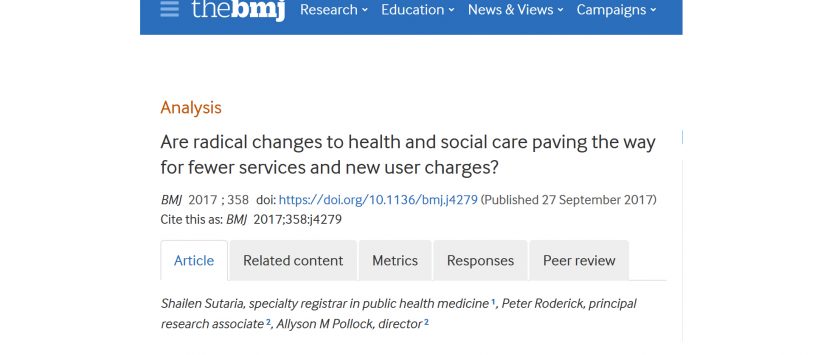
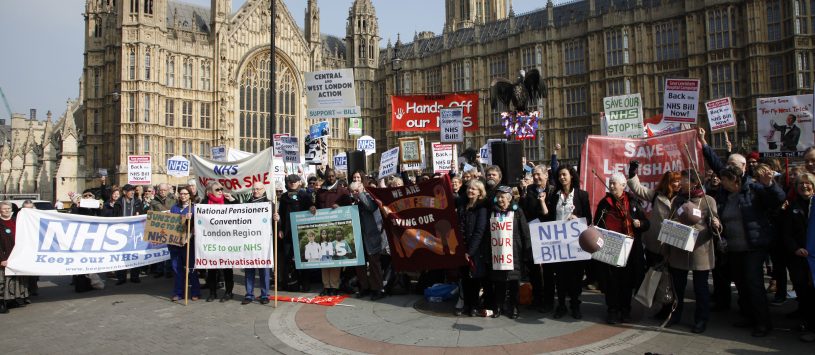

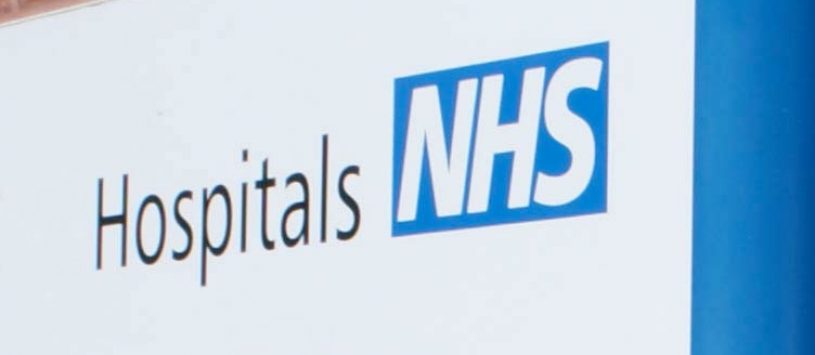


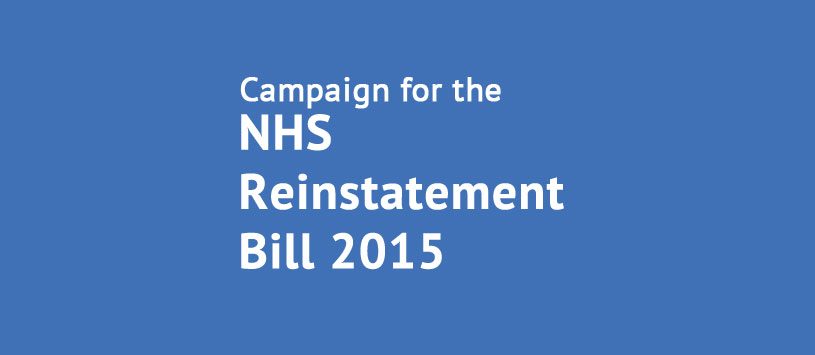



 Tory MPs filibuster to block Efford Bill
Tory MPs filibuster to block Efford Bill Response of Peter Roderick and Professor Allyson Pollock to Lord Hunt
Response of Peter Roderick and Professor Allyson Pollock to Lord Hunt House of Commons Library briefing amended – no longer any mention of re-establishing or reinstating a legal duty to provide
House of Commons Library briefing amended – no longer any mention of re-establishing or reinstating a legal duty to provide

 Efford Bill 2nd Reading – Friday 21st November
Efford Bill 2nd Reading – Friday 21st November Response to Clive Efford MP’s Bill
Response to Clive Efford MP’s Bill